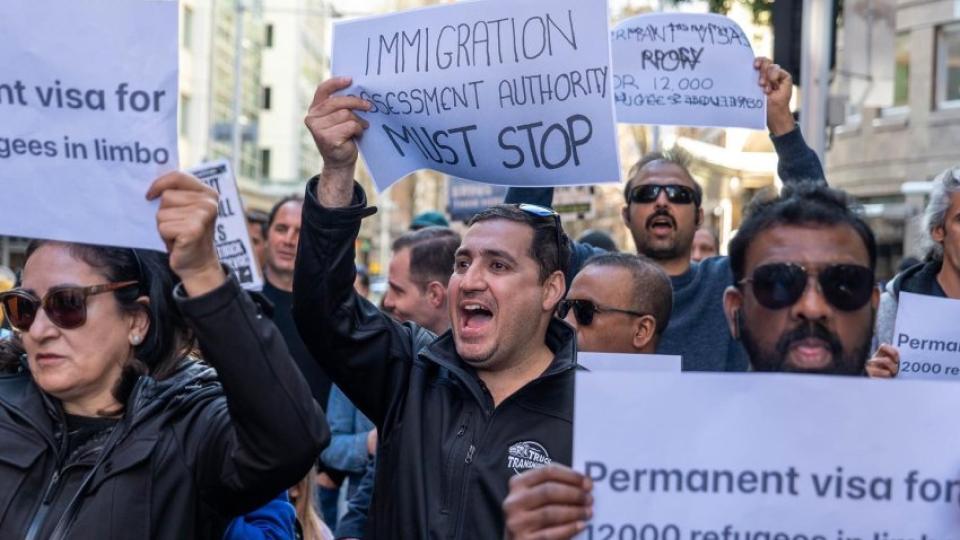Sink Labor’s racist refugee bill

Anthony Albanese’s government has made some pretty bad decisions since being elected in May 2022 (think coal mining and Stage 3 tax cuts).
But nothing scrapes the bottom of the barrel as badly as the potentially deadly Migration Amendment (Removal and Other Measures) Bill 2024.
If this woefully rushed draconian bill, after a review, is passed in the Senate (it was pushed through by Labor and the Coalition in the Legislative Assembly) it will give immigration minister Andrew Giles the power to send people seeking Australia’s protection back to countries where they could be killed. It would also jail people who resist a deportation order.
The case of a bisexual Iranian man, known as ASF17, who is Kurdish and Christian, is one example.
While never committing a crime in Australia, he was held in detention for 10 years because he refused to co-operate with officials’ attempts to return him to the possibility of a death sentence in Iran.
The High Court decided last November that indefinite immigration detention is unlawful and ASF17 was released.
Labor’s new migration amendments are widely considered to be a ham-fisted attempt to preempt further litigation, scheduled in the High Court.
Law and justice academics from the University of New South Wales believe the bill sets dangerous precedents.
They said the amendments are a “radical departure from the existing framework” that could “criminalise the migration system” and that “the consequences could be disastrous”.
The academics also warned that if the bill became law it could “have wide-ranging impacts for how non-citizens are treated in Australia and indeed for Australia’s relationship with governments around the world”.
They were referring to what the bill describes as “removal concern countries”, or countries that do not accept people returned from Australia.
New asylum seekers from Russia, Iran, Iraq and South Sudan could be barred.
Labor ministers, including Giles and Katy Gallagher, Manager of Government Business in the Senate, are downplaying the impact of the bill, describing it in tame, innocuous language.
Giles said it provided the government with the “necessary tools” to strengthen migration laws. Gallagher said the laws were about filling a “gap”.
However, at least three Labor senators have expressed concern about the amendment’s “broad and unfettered powers”.
These racist and reactionary amendments are equal to, if not worse than, anything former Coalition Prime Ministers John Howard, Tony Abbot, Scott Morrison and the toadying former immigration minister Peter Dutton, could have introduced.
Some argue that Labor has “abandoned all principles” as its popularity sinks: racism is a handy distraction after the failed Voice referendum and as the cost-of-living crisis deepens.
It has worked for Labor in the past and has been Albanese’ track record in opposition and as PM ever since former leader Bill Shorten lost a supposedly “unlosable” federal election to Morrison in 2019.
Then Labor concluded it would have to promise less and continue supporting the Coalition’s dog-whistling policies on immigration and offshore detention.
Labor endorsed Morrison’s AUKUS deal with the United States and Britain, including its anti-China rhetoric, kept most of its anti-worker laws in place and agreed to the Stage 3 tax cuts for the rich to win the 2022 election.
Labor was also complicit in the Dutton-Morrison war on refugees.
Labor has its own inglorious history of supporting racist refugee policy.
PM Paul Keating government introduced mandatory detention in 1992. PM Julia Gillard introduced offshore detention in 2012 and PM Kevin Rudd introduced the policy barring refugees arriving by boat from permanent settlement in an attempt to win the 2013 federal election.
Labor is only too happy to suggest, and action, reactionary policies against some of the most vulnerable people to curry favour with conservative and ignorant sections of the public to stay in power.
But, one has to ask — power to do what?
Given how much working people are suffering under the cost of living and housing crises, the answer has to be about the power to serve big business and the ruling class’ interests.
Blaming asylum seekers and migrants for policy failures makes a mockery of Albanese’s interpretation, in 2015, of former Prime Minister Ben Chifley’s famous “Light on Hill” speech about “Labor values”.
Albanese said then that Chiefly’s speech “resonated deeply with a people who pride themselves on egalitarianism and mateship” because Chifley emphasised “selflessness, compassion and social justice”.
Labor may once have aspired to those values, but its migration bill is an example of how far it has shifted away from them.
The sooner we build left political alternatives that truly represent the interests of the majority of working people in this country the better.
[Sue Bull is a national co-convenor of the Socialist Alliance.]